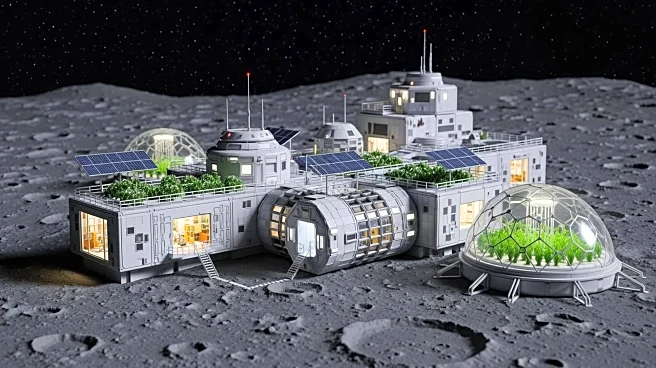What's Happening?
The United States, along with Russia and China, is planning to establish bases on the Moon within the next decade. This initiative is part of NASA's Artemis mission, which aims to use the Moon as a launchpad for future human travel to Mars. The mission is a significant
step in the broader goal of space exploration and potential colonization. SpaceX, led by Elon Musk, is also pushing forward with plans to colonize Mars by 2055, envisioning a future where humans become a multi-planetary species. However, the idea of space colonization is contentious, with experts divided on its feasibility and ethical implications. A recent discussion with five experts revealed that four are against the idea, highlighting concerns not only about the possibility of living in space but also about the methods and consequences of such endeavors.
Why It's Important?
The plans for lunar bases and eventual Mars colonization represent a significant shift in space exploration, with potential impacts on international collaboration, technological advancement, and economic investment. The U.S. and other major space-faring nations are investing heavily in these projects, which could lead to new industries and job creation. However, the ethical and environmental implications of space colonization are complex. Critics argue that the focus should be on addressing Earth's challenges rather than expanding into space. The debate touches on issues of resource allocation, environmental stewardship, and the potential for new forms of colonialism in space. The outcome of these discussions could shape future policies and priorities in space exploration.
What's Next?
As NASA and other space agencies move forward with their plans, there will likely be increased scrutiny and debate over the ethical and practical aspects of space colonization. Stakeholders, including governments, private companies, and international organizations, will need to address these concerns while balancing the potential benefits of space exploration. The development of lunar bases and the Artemis mission's progress will be closely watched, with potential implications for international relations and space policy. Public engagement and expert consultations will be crucial in shaping the future direction of these ambitious projects.
Beyond the Headlines
The discussion around space colonization also raises questions about humanity's long-term survival and the role of technology in addressing existential threats. The potential for space to serve as a 'backup' for humanity in the face of global catastrophes is a compelling narrative, but it also underscores the need for responsible and sustainable exploration practices. The cultural and philosophical implications of becoming a multi-planetary species are profound, challenging our understanding of identity, community, and stewardship of the cosmos.

















